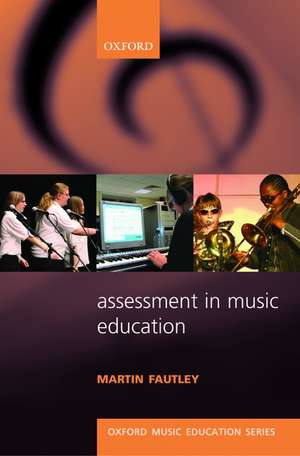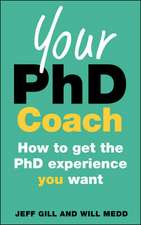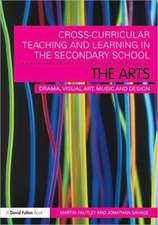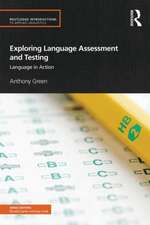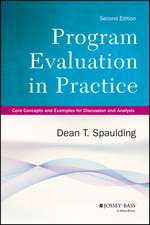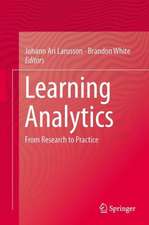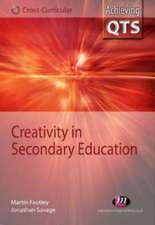Assessment in Music Education: Oxford Music Education
Autor Martin Fautleyen Limba Engleză Paperback – 14 ian 2010
Preț: 182.28 lei
Preț vechi: 244.71 lei
-26% Nou
Puncte Express: 273
Preț estimativ în valută:
34.88€ • 36.68$ • 28.82£
34.88€ • 36.68$ • 28.82£
Carte disponibilă
Livrare economică 17-22 martie
Livrare express 12-18 martie pentru 88.77 lei
Preluare comenzi: 021 569.72.76
Specificații
ISBN-13: 9780193362895
ISBN-10: 0193362899
Pagini: 240
Ilustrații: Illustrations
Dimensiuni: 157 x 233 x 14 mm
Greutate: 0.37 kg
Editura: Oxford University Press
Colecția OUP Oxford
Seria Oxford Music Education
Locul publicării:OXFORD, United Kingdom
ISBN-10: 0193362899
Pagini: 240
Ilustrații: Illustrations
Dimensiuni: 157 x 233 x 14 mm
Greutate: 0.37 kg
Editura: Oxford University Press
Colecția OUP Oxford
Seria Oxford Music Education
Locul publicării:OXFORD, United Kingdom
Recenzii
Even before I picked this book up, I knew it was going to be a good one . . . Fautley makes it come alive. It is not just the quality of the writing and the humour. He shows us why it matters and what a difference good assessment can make to young people - and that I find interesting . . . What is so good about this book is that Fautley not only outlines the problems but also suggests solutions . . . Throughout this clearly written, highly readable book two central areas of concern emerge. One is that the most important role for assessment is to help students 'get better' at music. The other is that any practical solutions offered have to fit in with the reality of a workforce which is currently working at full stretch. It is these two priorities that make this book so important. If God hadn't wanted us to sort out assessment in music education, he wouldn't have given us Martin Fautley.
Assessment in Music Education provides a very welcome 'bible' for understanding every aspect of assessment in music education . . . In general the writing style is accessible - a real achievement with such a multi-faceted and complex topic. In the more theoretical sections, Fautley makes a real effort to simplify concepts to communicate them effectively to his readers . . . Assessment in Music Education is a well-referenced compendium of information on all aspects of the topic. Whether or not the present government decides to continue the current emphasis on assessment in the cloassroom, this will remain a standard work in the field.
Fautley has a genius for the visual model when summing up the discourse of assessment . . . Not the formulaic version of formative assessment which often permeates UK schooling, but that which is based upon a rich dialogue between pupils and teachers . . . Music education has been in need of a serious treatise on assessment for some time now, and this accessible and rigorous book fits the bill. After reading it no music educator has an excuse for not engaging with effective assessment practice or not having strategies that go beyond learning objectives, levelling and setting targets. Here Fautley draws out a myriad of possibilities from simple ideas supported with a sound theoretical underpinning. This book will be important to teachers of all types in all contexts as well as teacher educators, policymakers, academics, head teachers and those providing continuing professional development. Look forward to the next volume!
Assessment in Music Education provides a detailed but very readable exploration of the theory and practice of assessment in the classroom, largely at Key Stage 3 . . . It is the most thoughtful exposition I know of teaching and learning in the Key Stage 3 National Curriculum, even if its conclusion is that, 'At present, it is not entirely clear what progression in music learning entails'.
Assessment in Music Education provides a very welcome 'bible' for understanding every aspect of assessment in music education . . . In general the writing style is accessible - a real achievement with such a multi-faceted and complex topic. In the more theoretical sections, Fautley makes a real effort to simplify concepts to communicate them effectively to his readers . . . Assessment in Music Education is a well-referenced compendium of information on all aspects of the topic. Whether or not the present government decides to continue the current emphasis on assessment in the cloassroom, this will remain a standard work in the field.
Fautley has a genius for the visual model when summing up the discourse of assessment . . . Not the formulaic version of formative assessment which often permeates UK schooling, but that which is based upon a rich dialogue between pupils and teachers . . . Music education has been in need of a serious treatise on assessment for some time now, and this accessible and rigorous book fits the bill. After reading it no music educator has an excuse for not engaging with effective assessment practice or not having strategies that go beyond learning objectives, levelling and setting targets. Here Fautley draws out a myriad of possibilities from simple ideas supported with a sound theoretical underpinning. This book will be important to teachers of all types in all contexts as well as teacher educators, policymakers, academics, head teachers and those providing continuing professional development. Look forward to the next volume!
Assessment in Music Education provides a detailed but very readable exploration of the theory and practice of assessment in the classroom, largely at Key Stage 3 . . . It is the most thoughtful exposition I know of teaching and learning in the Key Stage 3 National Curriculum, even if its conclusion is that, 'At present, it is not entirely clear what progression in music learning entails'.
Notă biografică
Martin Fautley began his career as a music teacher, teaching in secondary schools in the Midlands (UK). He taught a broad spectrum of pupils, was director of a number of successful school musical ensembles, and ran a music centre, where he was in daily contact with instrumental learning. Following an in-service MA in education, he returned to full-time study at Cambridge University, where his doctoral research into group composing, and the role that teacher assessment can play in developing it, bridged the education and music faculties. In 2007 Martin became Reader in Music Education at Birmingham City University, where he has written and published widely on matters concerning creativity and assessment. He continues to undertake research into these key areas of education, and is a regular presenter at conferences.
